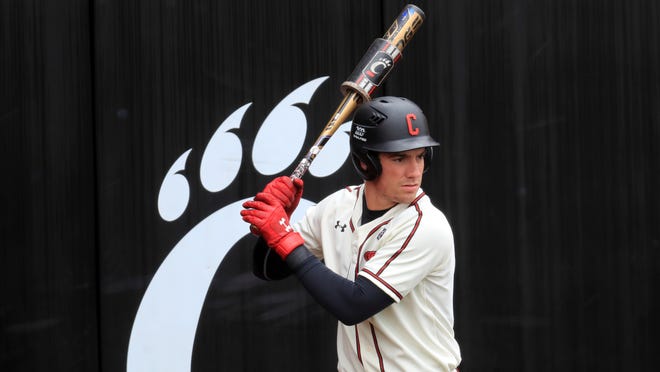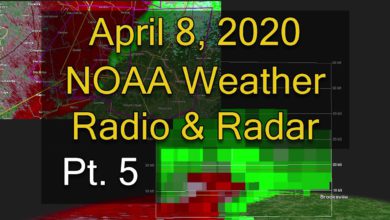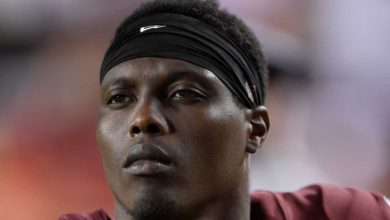
This weekend saw the return of many in-person graduations for the first time in a year as vaccinations steadily climb and coronavirus restrictions ease around the country.
Purdue President Mitch Daniels told students if any class deserved a celebration such as a ceremony, "it's you."
The ceremony at the Indiana university took place outside, as it did at Kent State University in Ohio. The ceremonies at the university also were smaller than in previous years.
And at Vanderbilt University, commencement speaker and top immunologist who leads the U.S. COVID-19 response, Dr. Anthony Fauci, spoke virtually, laying out the difficult times that graduates will head into after their commencement services.
"No students dating back 100 years... have had this level of disruption to their student years," Fauci said. "The world has changed dramatically... The adjustments you will have to make in the world are profound."
Also speaking at Emory University in Georgia this weekend, Fauci said the coronavirus crisis has "shone a bright light on our own society’s failings.”
“Societal divisiveness is counterproductive in a pandemic,” Fauci added. “We must not be at odds with each other since the virus is the enemy, not each other.”
CDC declares racism a 'serious public health threat' as COVID-19 puts a spotlight on disparities
Also in the news:
►The head of Germany’s independent vaccine advisory panel says it’s likely that everyone will have to get vaccinated again next year against COVID-19.
►The currently available vaccines have shown signs in the United Kingdom of being effective against the coronavirus variant first identified in India, believed to be a major contributing factor to the surge in cases in that country.
►More than 50% of California residents have received at least one dose of the COVID-19 vaccine, according to the Los Angeles Times. The largest state in the nation ranks 12th among all states in percentage of residents vaccinated with at least one dose, according to the U.S. Centers for Disease Control and Prevention.
►On Saturday, the Massachusetts Department of Public Health reported that 352 patients with confirmed coronavirus cases were hospitalized in the state, of which 97 were reported to be in an intensive care unit. This marks the first time that the number of COVID-19 patients in ICUs across the state has been below 100 since Nov. 2, 2020.
►Police are reaching out to villagers in northern India to investigate the recovery of bodies buried in shallow sand graves or washing up on the Ganges River banks. There’s been speculation on social media that they are the remains of COVID-19 victims.
? Today's numbers: The U.S. has more than 32.9 million confirmed coronavirus cases and 585,900 deaths, according to Johns Hopkins University data. The global totals: More than 162.78 million cases and 3.37 million deaths. More than 344.5 million vaccine doses have been distributed in the U.S. and 272.9 million have been administered, according to the CDC. More than 123 million Americans have been fully vaccinated — 37% of the population.
? What we're reading: Honor system, paper cards won't cut it for COVID-19 vaccine verification, experts say. 'Vaccine passports' are coming.
Keep refreshing this page for the latest updates. Want more? Sign up for our Coronavirus Watch newsletter for updates to your inbox and join our Facebook group.
Sanofi and GSK rejoin COVID-19 vaccine effort
After deciding last fall that their COVID-19 candidate vaccine wasn’t working well enough, pharmaceutical giants Sanofi and GSK improved the formulation and the pair are now back in the vaccine game.
Early Monday, they released results from a mid-stage clinical trial of their new vaccine and announced plans to begin a definitive trial with 35,000 participants within a few weeks. The companies reported that in their Phase 2 trial nearly all the 722 participants mounted an immune response after the second of two shots, without any significant safety concerns.
The vaccine was tested in adults ages 18-95, with those under 60 showing a stronger immune response. After a single shot, participants who had previously been infected with COVID-19 generated a substantial amount of so-called neutralizing antibodies, suggesting the vaccine could work well as a booster, the companies said.
“Our Phase 2 data confirm the potential of this vaccine to play a role in addressing this ongoing global public health crisis, as we know multiple vaccines will be needed,” Thomas Triomphe, executive vice president and global head of Sanofi Pasteur, the vaccines business unit of Sanofi, said in a statement.
The companies delayed a previous version of their vaccine last December, deciding it wasn’t performing well enough, particularly in older adults.
While the United States now has all the vaccine supply it needs for the moment, most other countries do not, and more shots will likely be needed in the next year or two as new variants and time weaken protection from the first doses.
- Karen Weintraub
'This is a relief': Vaccination drive targets underserved Hispanic community
Jorge Chavez tried for weeks to get a COVID-19 vaccine through the usual routes. But the Lake Worth Beach, Florida, resident said a language barrier, overloaded websites, and a lack of proper documentation kept him from securing an appointment.
That changed when he walked into an El Bodegon supermarket and met a representative from the Caridad Center, a nonprofit west of Boynton Beach that provides medical care to low-income residents.
In a few moments he was signed up for a vaccine, and Sunday he walked out of their clinic relieved to have received his first dose.
“I’m happy to get it,” he said. “It was difficult before but this is a relief.”
Chavez was one of 600 people, most of them Hispanic, who registered to receive the first dose of Pfizer’s COVID-19 vaccine at the Caridad Center’s clinic Sunday, the latest vaccine drive targeting the county’s Hispanic population.
The coronavirus pandemic across Florida continues to slow, even as inoculations languish and the state continues adding more infections than its more populous peers.
The state's racial and ethnic gap in COVID-19 vaccinations also showed further signs of closing, with the state's Hispanic residents showing a substantial uptick in inoculations as of Saturday.
- Andrew Marra and Chris Persaud, Palm Beach Post
Head of CDC defends eased mask guidance
The head of the CCDC on Sunday defended the latest easing of mask mandates and said her agency is working on new guidance for the school year that will begin in three months in some districts.
Dr. Rochelle Walensky, in a series of interviews with Sunday morning news shows, said “evolving science” drove the decision to update the government's guidance to allow those fully vaccinated for COVID-19 to shed their masks in most circumstances. Walensky denied that the decision was politically driven as Americans grow weary of wearing masks.
"Right now, the data, the science shows us that it’s safe for vaccinated people to take off their masks," she said on NBC News' "Meet the Press." "I, as the CDC director, promised the American people I would convey that science to you as we know it.”
Walensky was asked on "Fox News Sunday" whether changes are coming in guidelines for schools, where masks and social distancing remain policy mainstays.
"Our school guidance to complete this school year will not change, and we will be working on school guidance for the fall," she said. "We need to update our school guidance, our child care guidance, our camp guidance our travel guidance. We have a lot of work we need to do."
Walensky said it was "premature" to declare victory over the pandemic.
"We have to remain humble. We've had way too many curveballs," she said. "I have cautious optimism, but my vigilance hasn't changed."
Remote learners at North Carolina high school excluded from prom, even if they were invited
For many students, prom is a pivotal high school memory, but for Isabella Killough, plans to celebrate a final time among her friends were not permitted.
A senior at Burns High School in Lawndale, North Carolina, Killough was not allowed to attend prom on May 1 because she is a remote learner.
“I was very discouraged because after a crazy school year, it was something to look forward to,” Killough said. “When you realize you can’t participate in a normal thing, it’s really sad.”
Emails were sent to students saying remote learners would be excluded from extracurricular activities, yet none used the word “prom.”
Still, Greg Shull, director of communications for the Cleveland County school district, said the school has been transparent all along.
“That communication was well on the front side of the school year,” Shull said. “They decided if you are a remote learner and you wanted to be in any extracurricular activities, you have to be on campus."
The same conflict has been echoed in school districts across the country where remote learners have been excluded from proms as part of policies restricting extracurricular activities to only in-person students.
-- Latrice Williams and Christine Fernando, USA TODAY Network
Contributing: The Associated Press
Source link








